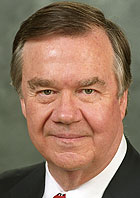Richard J. Smith, Ph.D., the Ralph E. Morrow Distinguished University Professor and chair of the Department of Anthropology in Arts & Sciences, will become dean of the Graduate School of Arts & Sciences July 1, 2008, when Robert E. Thach, Ph.D., dean since 1993, steps down, announced Edward S. Macias, Ph.D.

“Richard Smith is ably poised to succeed Bob Thach, whose extraordinary leadership has made a significant impact on graduate education not only at Washington University but also nationally,” said Macias, executive vice chancellor, dean of Arts & Sciences and the Barbara and David Thomas Distinguished Professor in Arts & Sciences.
“Bob has introduced many innovative programs within the Graduate School that have greatly improved the graduate student experience here and have been emulated at other top research universities,” Macias said. “I am confident that Rich will continue the positive momentum that Bob has set in motion.”
“I am honored to have the opportunity to take on this new challenge,” Smith said. “The graduate school has complex responsibilities serving students in schools and departments throughout the University. Bob Thach has done an outstanding job moving the graduate school forward, and he is leaving it superbly positioned for further progress in the distinction and excellence of our programs.
“I am looking forward to working with Washington University faculty and the dedicated staff of the graduate school as we make new efforts to increase our national and international leadership in graduate education,” Smith said.
Thach, a professor of biology in Arts & Sciences and of biochemistry and molecular biophysics in the School of Medicine, will return to full-time teaching and research. His research in epidemiology and environmental medicine will focus on vector-borne diseases, including Lyme-like and Ehrlichiosis diseases.

Among the highlights of his tenure as dean, Thach developed innovative ways to reduce time-to-degree and increase the completion rate for doctoral candidates by admitting fewer Ph.D. students, providing stipend support for six years and generating year-round financial support for those who apply; created a global focus in attracting outstanding graduate students, including organizing the International Graduate Scholarship Conferences in Beijing (2005) and Shanghai (2006); and encouraged shared governance, where graduate student leaders actively participate in the administrative activities of the University.
Recognized as a national leader in improving doctoral education, Thach, from 2001-05, chaired the Deans’ Task Force of the Woodrow Wilson National Fellowship Foundation’s Responsive Ph.D. initiative aimed at providing a richer purpose for Ph.D. education in the United States. He has been co-chair of this consortium of 20 leading research universities since 2005.
He recently completed terms on the Association of Graduate Schools’ Executive Committee, the Council of Graduate Schools’ Board, Emory University’s Graduate School Advisory Council and the Graduate Record Examination Board, of which he was chair.
Thach was featured in a recent Chronicle of Higher Education cover story for his involvement in developing Academic Analytics’ Faculty Scholarly Productivity Index, the newest and most academically reliable ranking system for graduate programs in the United States.
Prior to becoming dean of the Graduate School, he was chair of the University’s Department of Biology from 1977-1981, coordinator of the Program for Special Major in Biochemistry and Molecular Biology from 1983-1993, director of the Graduate Program in Molecular Biology from 1974-77 and director of the Center for Basic Cancer Research from 1972-77.
“It has been an absolutely wonderful 14-plus years with never a dull moment,” said Thach of his years as dean. “The focus of attention and requirements are changing continuously, which keeps it always new and fresh. Rich Smith will certainly find the job exciting and challenging.”
About Richard J. Smith
Smith has held a number of leadership positions since he came to the University in 1984 as professor and chair of the Department of Orthodontics in the School of Dental Medicine and as an adjunct professor of anthropology in Arts & Sciences.
In 1989, he was appointed dean of the School of Dental Medicine as a decision was being made to close the school. For the next two years he took the leadership role in completing the school’s closing.
He joined the Department of Anthropology faculty in 1991 and has been chair since 1993.
Smith helped create the Program in Applied Statistics and Computation, now the Center for Applied Statistics, in Arts & Sciences and served as its first director from 2002-04.
His research focuses on the ways in which statistical assumptions are used when new knowledge is incorporated into the general record of human evolution; specifically, how the human fossil record, being incomplete, can be studied and whether complex inferences drawn from the record can be validated.
He is particularly interested in how this relates to the evolution of the human brain, the craniofacial skeleton and the differences between gender in body size.
Popular with students, Smith teaches an introductory physical anthropology course, advises undergraduates and mentors graduate students. He was elected an honorary member of the Golden Key Honor Society and the Order of Omega, the Greek leadership honorary, and he received the Emerson Excellence in Teaching Award in 2001.
In 2005, he received the Distinguished Faculty Award at Founders Day, which is given for outstanding commitment and dedication to the intellectual and personal development of students.
Smith earned a bachelor’s degree in psychology from Brooklyn College of the City University of New York in 1969 and a master’s degree in anatomy and a dental degree, both in 1973, from Tufts University.
After completing a three-year orthodontics residency at the University of Connecticut Health Center, he went to Yale University, where he earned a doctorate in anthropology in 1980.